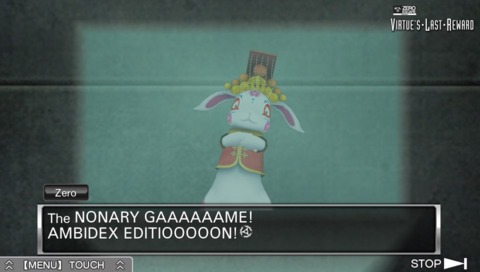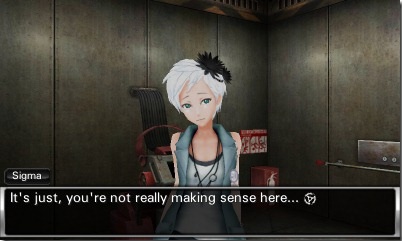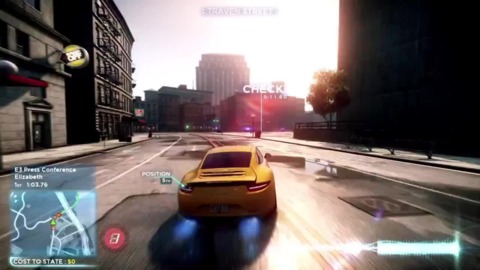Weekly Roundup 11/04/2012
By majormitch 4 Comments
In what turned out to be a crummy week for a lot of people on the east coast, I lucked out with Hurricane Sandy. Despite some strong winds I managed to not lose power, which meant that my gaming went along unhindered this week. In fact, I actually got an extra day out of the storm due to work closing. So what did I use that extra day for? Zero Escape: Virtue’s Last Reward, of course.

I really enjoyed Nine Hours, Nine Persons, Nine Doors (still a gloriously ridiculous name) when I played it early last year. It was a bold adventure game with an insane twist near the end, and the way it justified the idea of multiple endings within the context of its narrative kind of blew my mind. In fact, 999 was just plain crazy in general, which was certainly one of the things I liked about it so much. Despite the name change, Zero Escape is a fairly standard follow-up to 999. You’re once again trapped in the “Nonary Game” with eight other strangers, forced to solve puzzles in attempt to escape with your life. The particulars of the Nonary Game itself have changed a bit this time, most of which are pretty minor (such as the way you open doors via colors rather than through digital roots). The biggest change by far is the way the game forces you to periodically “ally” or “betray” different characters (a variation on the "prisoner's dilemma"). At the end of each round you vote to "ally" or "betray" the person you were partnered with that round. If both parties choose “ally”, they both get 2 points. If both choose “betray”, they both get 0 points. But if Party A chooses “ally” and Party B chooses “betray”, then Party A loses 2 points, while Party B gains 3 points. To clarify, you start with 3 points, and getting to 9 lets you escape. If you get down to 0 points, you die. Shit gets real.
In theory, if everyone chose to ally every single time, then everyone would gain points equally and everyone would escape safe and sound. That’s the ideal outcome, but all it takes to mess the whole thing up is one greedy person who wants more points faster, and is willing to take advantage of someone else’s trust to get them. It’s a dirty, dirty game, and the entire dynamic ends up being more or less the thematic core of Zero Escape. It certainly takes its opportunities to comment on human nature where it can, frequently challenging how much you can trust characters you barely know. In addition, how the different characters react to being “allied” or “betrayed” creates some of the game’s most touching and/or heart-wrenching moments, and just a lot of tension in general. Not only that, but these choices are also the main factor leading to the game’s insane multiple timelines that define the game’s flow. Every choice between “ally” and “betray”, along with the different doors you decide to go through, splits the timeline further and further until you’re left with a jumbled mess of parallel outcomes. It’s a butterfly effect of sorts, and a lot of the joy of the game is seeing how each of the different threads resolve. There are a lot of different crazy mysteries going on behind the scenes of the Nonary Game, and the only way you can piece it all together is to explore all the timelines and see all the endings. Hopefully that will all be justified by the game’s end, just as it was in 999.

In fact, Zero Escape relies even more heavily on the multiple timelines idea than 999 did. You have access to a flowchart showing all the different paths from the start, and you can actually jump around at any time without losing much progress in the path you’re currently on. On top of that, you can skip dialogue much quicker, and can fast forward through dialogue you’ve seen before too. All of this makes Zero Escape a much snappier game than 999, which could be incredibly slow at times. I do wonder if any of Zero Escape’s endings will be able to match 999’s though. That will be tough, as 999’s “true” ending was totally nuts. So far that hasn’t happened, but Zero Escape looks like it has more endings to work with (it’s definitely a bigger game). I’ve seen about half of them so far, so the potential is still there. Finally, despite the ridiculous premise, what really makes Zero Escape work is that same thing that makes every good adventure game work; the characters and the writing. The game’s cast of characters are diverse and interesting, and the writing is clever and sharp (and surprisingly well voice acted). I’m enjoying simply seeing the story and its mysteries unfold, and guiding it along as I see fit. I’m really curious to see how it all ends up, and will certainly keep playing.
To balance the slower paced, story focused nature of Zero Escape, I also picked up and started playing Need for Speed: Most Wanted this week. Those two games actually complement each other very well; just when I get tired of one, I’m in the mood for the other. Most Wanted, in contrast to Zero Escape, is no story and all action, and the action is beautiful. I’m a known fan of the Burnout series, but have never really liked many other driving games. Burnout Paradise in particular is an all-time favorite, and I’ve basically been following Criterion ever since in hopes that they can deliver more magic. Their Need for Speed: Hot Pursuit didn’t do it for me two years ago, but Most Wanted is fortunately a big step in the right direction. I’m digging it so far.

Honestly, the main reason I’ve liked Burnout as opposed to other driving games is because Burnout is completely balls out; it sets the speedometer to 11 and only goes up from there. The series always focused on driving hella fast, crashing as often and as gloriously as possible, and most importantly, running super smooth and controlling incredibly well. It’s as far removed as you can get from any kind of realistic driving, but that always made it feel more like an actual enjoyable video game to me, like the design decisions were made to be crazy and fun rather than sterile and realistic. Most Wanted seems very much in line with that vision, and with the exception of the comparatively pitiful crashes (damn those licensed cars), it hits most of the high points that Criterion established with the Burnout series. Mainly, it’s super fast, and it controls super well. My biggest question mark going into this game was how the car handling would be, as Hot Pursuit’s handling was a little closer to the stiffer simulation side of things. Fortunately, the car handling is fantastic in Most Wanted. Everything is super snappy and fluid, and you can whip cars around corners at high speeds with ease. It’s good stuff.

There are some nit picky things with the basics though. I do wish some of Burnout’s more outlandish stunts returned, such as flat spins and barrel rolls. Those types of feats are the only things I find lacking in Most Wanted’s control department, which is a minor enough omission, but it also speaks to the kind of stuff that makes Burnout special. The game also doesn’t run quite as well as I would like, at least on the Xbox 360. Past Burnout games were silky smooth, but Most Wanted has the occasional stutter here and there, and otherwise just doesn’t seem to be as crisp. Again, not a game breaker, but still a notable downgrade. Lastly, the other thing Burnout Paradise in particular did that really blew me away was provide a huge, well designed city to explore and mess around in. Most Wanted finally gets Criterion back to an open world racer, but Fairhaven hasn’t been quite as impressive as Paradise City so far. For the most part it’s totally fine, and I much prefer it to selecting races out of a menu. But from what I’ve seen the city isn’t as big or as varied, and doesn’t seem to have a comparable charm or personality. It’s still a whole lot of fun to drive around and explore Fairhaven’s nooks and crannies (especially since the car handling is so great), but I feel like it won’t keep me hooked quite as long as Paradise City did. We’ll see.
Anyway, those are all early impressions on Most Wanted’s basics from a Burnout fan. It’s not quite Burnout, but it’s most of the way there, especially where it matters most. In other words, it’s probably the best I can hope for in lieu of a proper new Burnout game. I’m certainly enjoying it so far, and I’m sure I’ll have plenty more to add next week as I dig further into the game’s various activities, both online and off. This week will likely continue to be more Most Wanted and Zero Escape; keep the winning pair going. I'll also probably pick up Halo 4 at some point, but I haven’t committed to anything there just yet. So that’s going to do it for now, until next time!
Currently playing: Zero Escape: Virtue's Last Reward, Need for Speed: Most Wanted
